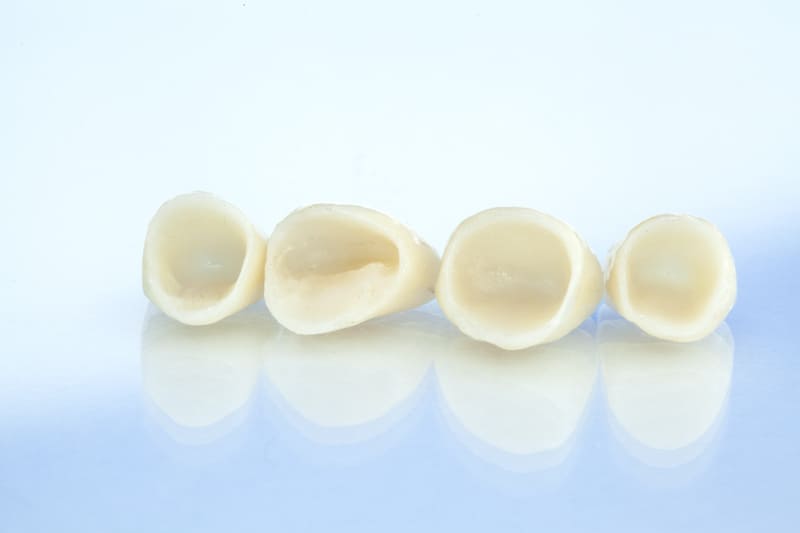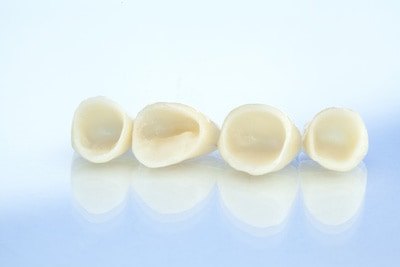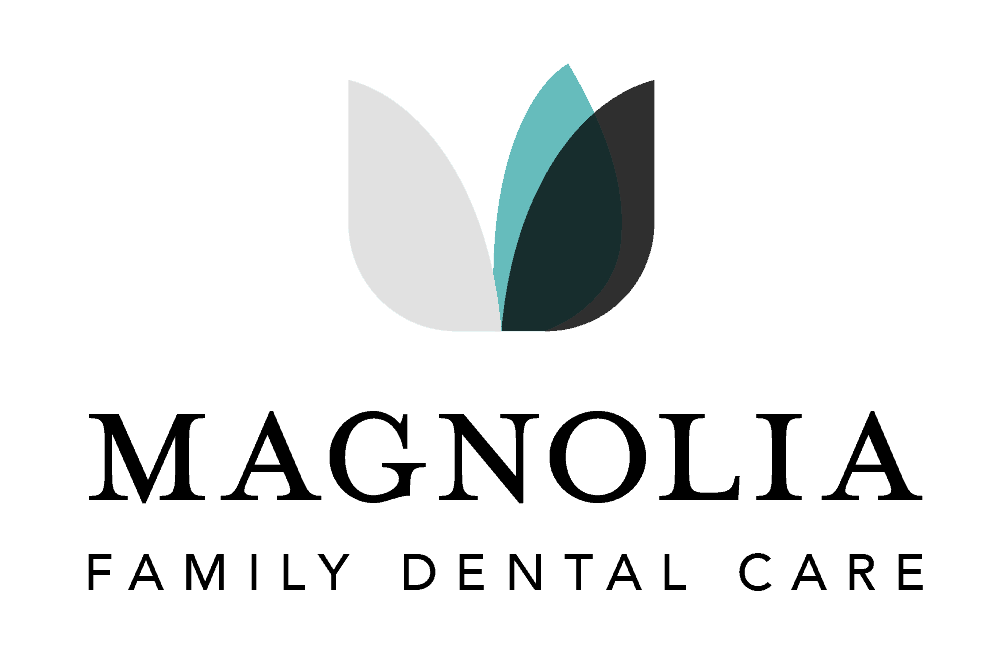
19 Oct Tulsa Dental Crowns Frequently Asked Questions
Dental crowns might not be the first chosen topic of conversation over coffee or dinner, but we know that many of our friends, family, and valued customers have questions concerning them! No need to have an awkward conversation with that your uncle or friend who also happens to be a dentist. Instead, we have a full guide on everything you need to know about getting dental crowns from Tulsa’s Magnolia Family Dental.
What are dental crowns? A dental crown is a cap designed to fit perfectly over your tooth. This cap will strengthen the tooth, restore its size and shape, and enhance the tooth’s looks and performance.
A dental crown is an excellent option if your tooth is about to or has already broken, you need a root canal (or have already had one), you have dental implants, or you don’t love the look of your teeth now. We know you might have more questions, so keep reading to find out more about Magnolia’s dental crowns.
Everything You Need to Know About Tulsa Dental Crowns
Our patients often have questions regarding the dental crown procedure. Keep reading for answers to some of your most frequently asked questions.
What Are Dental Crowns Made Of?
A Tulsa dentist uses numerous types of dental crowns to serve their customers best. Each type of dental crown is made using a unique blend of materials. Here are a few of the most common types:
Porcelain Fused to Metal
When a bridge needs the durability, the metal is a strong option and works for both front or back teeth. Porcelain has the advantage of having a great appearance because the colors can be customized and matched to the teeth to the right or left of it. However, some of the disadvantages of porcelain are that it can chip or break, show some wear, and sometimes reveal a dark metal line over time.
Stainless Steel Crowns
We usually use stainless steel crowns as a temporary solution while preparing another crown. We often use these crowns for children to help keep their primary tooth from decaying any further. The crown will slip free once a permanent tooth makes an appearance.
Temporary Crowns
Temporary Crowns, just like the stainless steel version, can be created in the dentist’s office so that your tooth can have immediate coverage. The temporary crown will protect the tooth and add extra strength until your new crown comes in. Acrylics are the primary material used to make temporary crowns.
All-Resin Crowns
All-Resin Crowns are a cheaper version of the crown because it is made entirely from resin. They are less expensive because they tend to fracture or wear down much faster over the long term than other types of crowns do.
All Ceramic or All Porcelain
These types of crowns are considered the choice version of crown mainly because of cosmetic reasons. All-ceramic or all-porcelain versions of the crown are the best types for color matching with your teeth. As an added benefit, they are an excellent option for patients who struggle with metal allergies.
Metal Crowns
Metal Crowns are created using certain alloys that can withstand long-term chewing or biting over the long-term and are very strong. They’re super durable and hard to break or chip. However, metal crowns look metal and are usually placed in the back of the mouth.
Do Dental Crowns Hurt?
 Getting a crown should not be a painful process since we will numb your mouth before putting your crown on. The entire procedure lasts about 2-4 hours.
Getting a crown should not be a painful process since we will numb your mouth before putting your crown on. The entire procedure lasts about 2-4 hours.
Although you shouldn’t be experiencing pain with your dental crowns, there are some exceptions to why it’s happening. If the dental crown was needed to fix large cracks or painful cavities in your tooth, the nerve might still be irritated for a short time after the procedure. Another cause of pain after a crown placement could be a bite problem (the way that teeth come together).
If an upper and lower tooth close oddly due to an improper bite, it can irritate your mouth. Thankfully, the irritation is reversible. A bad bite creates sensitivity to cold and tenderness on chewing. When the bite is off, the dentist can adjust the crown to correct the problem.
Another cause of pain could be irreversible damage to the tooth nerve due to a crack or some other decay. In this case, a crown alone will not treat the tooth, and you’ll need to talk to your dentist about a root canal.
You should be sure to tell your dentist if you’re experiencing abnormal pain after receiving your dental crown, especially if it lasts more than two weeks. Any problem that lasts longer than that is certainly out of the ordinary. Pain that persists or worsens after a dental crown procedure is not standard and needs your dentist’s evaluation.
Do Dental Crowns Come Off?
Occasionally, crowns do fall off. This is often because of the incorrect fitting. It could also be due to a small amount of enamel left for the crown to cling to. If this happens, clean the crown and the front of the tooth. You can temporarily replace the crown using dental adhesive or temporary tooth cement sold in stores for this purpose. Contact your dentist’s office immediately. Some situations that may cause your crown to fall off include:
- Cavities – A cavity at the edge of a crown causes a break in the seal between your tooth and the crown. A crown with a cavity under it will likely fall off.
- Contamination During Fitting – The cement gluing your crown in place must be dry when it’s first put on until it hardens. If saliva contaminates the adhesive, it might cause the crown to break later.
- Back Tooth – Dentists often have to shorten teeth when putting a crown on, and your back teeth are already pretty short. This makes it easier for crowns on back teeth or smaller teeth to come off.
Do Dental Crowns Stain?
Dental crowns sometimes stain over time. But, the staining level is usually less than regular teeth. Porcelain veneers or crowns may be the most likely to stain over time, especially when exposed to coffee, red wine, or smoking.
Do Dental Crowns Look Natural?
When making a crown, a dentist will essentially create a duplicate of the damaged tooth. The crown’s shape covering it will include curves, cusps, and ridges for the tooth to function correctly. Crowns are explicitly made to resemble natural teeth and can achieve a natural look using ceramics and porcelains.
Do Dental Crowns Have to Be Replaced?
While dental crowns have an average lifespan of about ten to fifteen years, each type of crown is different. You’ll need to discuss replacement or repair with your dentist. A Tulsa dentist will be able to examine your mouth and the crown to determine when you’ll need a replacement. You may require your dental crown changed over time due to damage, staining, or just normal wear and tear. Proper oral hygiene including brushing twice a day is the best way to care for your dental crowns.
Do Dental Crowns Feel Strange?
Ideally, a dental crown should fit perfectly in your mouth, just like your other teeth. You might need some initial adjustment to your new crown, however. You might feel the difference where the dental crown is. There could be new pressure on one side of your mouth, or it might not feel like your teeth fit together the same. You might also feel some difference in the jaw, whether the muscles or joints.
There could be mild soreness or just a different feeling. At first, give your mouth some time to adjust to having a crown. The procedure can be a lot on your mouth, anyway, so you might just be recovering. However, if these symptoms continue for several days or even weeks, be sure to call your dentist and make an appointment to get it checked out. These feelings could eventually lead to a more significant problem or TMJ in your jaw muscles, a strain that can cause headaches and several other uncomfortable feelings. When in doubt, call your dentist.
Can Dental Crowns Be Whitened?
According to the American Dental Association, whitening treatments do not work on the color of crowns. We cannot bleach crowns, and so most whitening treatments are ineffective. They will remain the color they were when the dentist placed them. The crowns will most often remain the same color as when the dentist puts them on (this can vary with porcelain crowns).
However, if your teeth are getting darker and your crowns are staying white, you can get a whitening treatment for your regular teeth to whiten them to the same color as your crowns. If you would like to whiten your teeth and you have on or a few crowns, be sure to consult your dentist. They’ll be able to direct you to the best treatment for your teeth with consideration to your dental crowns. At Magnolia Dental, we’ll offer you guidance on how to get your smile to gleam confidently.
In Conclusion
When you first meet someone new, you’ll notice their smile (or lack of one) right off. At Magnolia Dental, we want your smile to be the best, healthiest, and happiest it can be. We are committed to helping Tulsa smile bigger and brighter than ever before. We understand that some of our patients are scared of dental care. It’s a big step, but we consider our patients or family, and we will discuss any treatment needed for the health of your teeth, including dental crowns. Contact our team for more information regarding Tulsa dental crowns!


No Comments